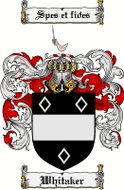 | This long-established surname is of Anglo-Saxon origin, and is locational from any of the various places so called in England, though the derivations of the placenames are slightly different. Whitacre in Warwickshire and High Whitaker in Lancashire are derived from the Olde English pre 7th Century "hwit" meaning "white", and "acer" meaning cultivated land; hence, "white field"; while both Whiteacre in Kent and Wheatacre in Norfolk derive their first element from the Olde English "hwaete", wheat, and therefore mean "wheat field". Locational surnames were usually acquired by a local landowner, or by the lord of the manor, and especially by those former inhabitants of a place who had moved to another area, usually in search of work, and were thereafter best identified by the name of the birthplace. An interesting namebearer, recorded in the "Dictionary of National Biography" was Joseph Whitaker (1820 - 1895), who founded the magazine, "the Book Seller", and started the annual publication of "Whitakers Almanac" in 1868. The first recorded spelling of the family name is shown to be that of Richard de Wetacre, which was dated 1177, in the "Pipe Rolls of Norfolk", during the reign of King Henry 11, known as "The Builder of Churches", 1154 - 1189. Surnames became necessary when governments introduced personal taxation. In England this was known as Poll Tax. Throughout the centuries, surnames in every country have continued to "develop" often leading to astonishing variants of the original spelling.
I have traced our Whitakers to the area of Leeds in Lancashire. The Whitakers of Lancashire are an Anglo-
Saxon family known at High Whitaker and the Holme
since the eleventh century and distinguished in literature
and in the Church. Several of them in remote times were
inmates of Kirkstall Abbey, still well preserved. Among
them were Wilham Whitaker, who headed the Reformation
in England ; Alexander Whitaker, the rector at Jamestown,
who married Pocahontas to Rolfe; John Whitaker, the
historian of Manchester, and Thomas Dunham Whitaker,
who wrote the History of Whalley.
|
